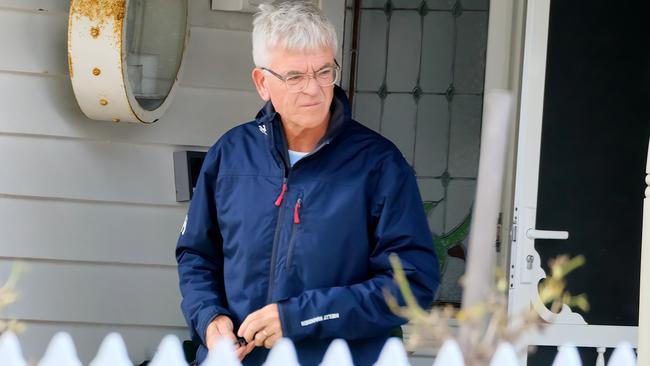Cheat in a windcheater: at home with ‘quiet’ crook Peter Collins who burned down PwC
Months after PwC’s former head of international tax Peter Collins went to ground, his former colleagues are still in shock over his alleged role in a scandal that set fire to the firm.

He’s the man accused of setting the fire that has raged through the biggest of the big four accounting firms, costing PwC Australia upwards of $1bn. And now Peter Collins has finally turned up.
Hardly anyone had seen the former PwC partner for six months. Mr Collins was one of the most powerful accountants in the country, described by some colleagues as a player in the politics of PwC, while another said he was “highly intelligent” in the wake of revelations he misused confidential government information to help clients attempt to dodge tax.
Even some of his closest colleagues haven’t heard from him since last Christmas.
PwC’s former head of international tax has been missing from the family home, while the beach house in Sorrento has been shut up and dark.
Some sources have said Mr Collins had been told to go to Europe to avoid the scandal surging around the PwC story, while others said he hadn’t been sighted since disappearing from PwC in October last year.
But after his months-long absence, Mr Collins, wearing a blue spray jacket, was spotted leaving the family’s five-bedroom home he shares with his wife and two sons after months of vacating his home in Melbourne’s leafy south east.
When contacted by The Australian, Mr Collins declined to comment on the events triggered by his leaking of confidential government information.
But his exit from the firm in October last year was the catalyst for a crisis that has swept over PwC, forcing the firm to dump its local leadership and offload its government consulting business that senior industry insiders have tipped could have been worth up to $1bn.
A PwC spokeswoman refused to detail when the firm last dealt with Mr Collins, who was given eight months’ pay when he left the firm in October.
At first, PwC granted Mr Collins access to its lucrative retirement benefits, which would have guaranteed him $140,000 a year in perpetuity, but this was scrapped in June amid the growing furore around the tax leaks.
PwC insiders have been left questioning how a man described by one as “quiet, thoughtful” could trigger a meltdown at the country’s biggest audit and consulting firm that saw it sell its once-profitable government consulting business for $1.
“He was very different to the partners who were highly politically ambitious,” one former PwC tax partner said.
“He was highly regarded as an intelligent, thoughtful man who was fairly quiet and softly spoken.”
One former partner said Mr Collins was a key pillar of PwC’s tax team alongside Neil Fuller, who was tipped out of the firm in July. PwC’s tax practice was described as a black box within the firm, sitting largely outside the oversight of PwC’s local management, but showering the partnership in profits from its work with the big tech firms.
While another PwC partner, who was not part of the tax practice, said Mr Collins had been used as a sacrifice in a bid to stop the scandal dead. “Poor bastard, you know he’s just the patsy for the team,” he said. “The people who should go under the bus are (Tom) Seymour and (Pete) Calleja.”
Mr Calleja, who headed PwC’s financial services division, was among several partners removed from the firm in July over alleged links to the tax scandal.
Mr Seymour, PwC’s former chief executive, resigned from the top job on May 8 in the wake of a damming cache of emails published by the parliament showing Mr Collins sharing confidential information within the firm to other partners.
The emails, which were sent to Australian partners, as well as members of the firm in Asia, the US and Europe, openly bragged about PwC’s access to confidential information.
Mr Collins had signed three confidentiality deeds with Treasury as part of its consultation process over plans to reform Australia’s tax laws.
PwC was being brought in, despite concerns in the tax world over the firm’s highly aggressive approach which some characterised as a view that paying tax was optional.
“For your eyes only,” Mr Collins wrote to one partner in 2015, handing over a diagram from Treasury of its tax reform planning.
The emails show Mr Collins telling a PwC partner about the “opportunity to own this space” through the firm’s inside knowledge of the new tax schemes.
Mr Seymour had initially tried to characterise Mr Collins’ role in the scandal as a bad apple acting alone and more of a “perception problem”.
“We did have a partner breach a confidentiality agreement,” Mr Seymour said.
“That was totally unacceptable that he did that, and we’ve been very clear that that should never have happened.”
But documents have revealed knowledge of the tax scandal and confidentiality breaches spread to the highest levels of PwC. A timeline of the Australian Taxation Office’s investigation into the tax scandal shows Mr Collins’ breach of the confidentiality deeds had been picked by late 2017.
A source has noted the tax office was unsettled by Mr Collins openly talking about sharing confidential information to other partners in emails it seized.
The ATO sought to have the Australian Federal Police advise on what action could be taken against Mr Collins and PwC over the breaches, which the AFP ultimately dropped.
However, Mr Collins and PwC now face a new probe by the AFP, which was referred the tax scandal by Treasury in May.







